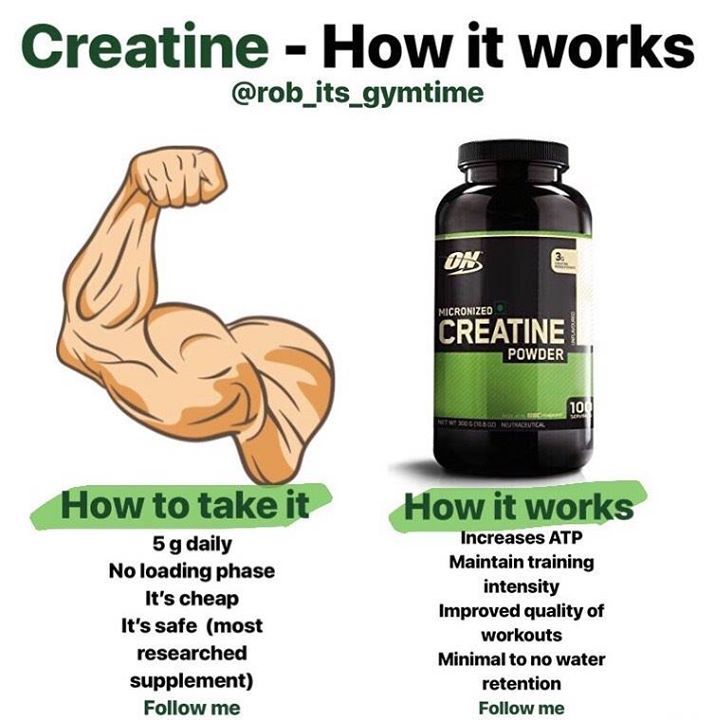Creatine 101: Your Guide To Understanding And Using Creatine Supplements

Table of Contents
What is Creatine and How Does it Work?
Creatine is a naturally occurring organic acid found primarily in skeletal muscle. It plays a crucial role in energy production within muscle cells, specifically aiding in the regeneration of adenosine triphosphate (ATP), the primary energy currency of the body. During high-intensity activities, ATP is rapidly depleted, leading to muscle fatigue. Creatine supplements help replenish ATP stores more quickly, allowing for greater power output and improved endurance during short bursts of exercise.
Several types of creatine supplements exist, each with varying absorption rates and purported benefits. The most common and well-researched form is creatine monohydrate, known for its effectiveness and affordability. Other forms include creatine hydrochloride (HCL) and creatine ethyl ester, often marketed as having superior absorption, although research on this claim is still ongoing.
- Creatine's role in high-intensity exercise: Creatine enhances performance in short-duration, high-intensity activities like weightlifting, sprinting, and plyometrics.
- The science behind creatine's impact on muscle growth and strength: By increasing ATP availability, creatine allows for more intense and prolonged training sessions, leading to greater muscle hypertrophy (growth) and strength gains.
- Comparison of different creatine forms and their bioavailability: While creatine monohydrate remains the gold standard due to extensive research and proven efficacy, other forms may offer potential advantages but require further investigation.
Benefits of Creatine Supplementation
The benefits of creatine supplementation are backed by substantial scientific evidence. Consistent use is strongly linked to:
- Increased strength gains: Creatine helps you lift heavier weights and perform more repetitions, leading to significant strength improvements.
- Improved power output: Experience more explosive power during activities requiring quick bursts of energy.
- Enhanced muscle mass: Creatine facilitates muscle growth by increasing training volume and intensity.
- Potential cognitive enhancement: Some studies suggest potential benefits for cognitive function, particularly in individuals with certain neurological conditions. However, further research is needed to solidify these findings. It is important to remember that this is not a guaranteed benefit for everyone.
These benefits make creatine a valuable tool for athletes, bodybuilders, and individuals aiming to improve their physical performance and build lean muscle mass.
How to Use Creatine Effectively
To maximize the benefits of creatine supplementation, it's crucial to understand proper usage. A common strategy is a creatine loading phase, where you consume higher doses (20 grams per day) for the first 5-7 days to rapidly saturate your muscles with creatine. This is followed by a maintenance phase, where you consume a lower daily dose (3-5 grams) to maintain muscle creatine stores.
- Optimal creatine dosage for different goals: Individual needs may vary, but the loading and maintenance phases described above are a widely accepted approach.
- Loading phase vs. maintenance phase: The loading phase accelerates the saturation process, while the maintenance phase ensures sustained benefits.
- The importance of hydration while taking creatine: Creatine draws water into muscle cells, so adequate hydration is essential to prevent potential side effects such as muscle cramps.
- Addressing common side effects and misconceptions: While generally safe, some individuals may experience mild side effects like water retention, weight gain, and gastrointestinal discomfort. These are usually temporary and resolve with proper hydration and dosage adjustment. Many common misconceptions about creatine causing kidney damage are largely unfounded when used appropriately and by healthy individuals.
Who Should (and Shouldn't) Use Creatine?
Creatine supplementation is generally safe and effective for healthy individuals, particularly those engaging in intense strength training or high-intensity interval training. Athletes, bodybuilders, and individuals aiming to increase muscle mass and strength often benefit greatly from its use.
- Individuals who may benefit most from creatine: Those engaged in strength training, weightlifting, sprinting, or other high-intensity activities.
- Individuals who should avoid creatine: Those with pre-existing kidney conditions should consult a doctor before using creatine. Pregnant or breastfeeding women should also avoid its use.
- Importance of medical consultation before use: Always consult with a healthcare professional before starting any new supplement regimen, especially if you have underlying health conditions.
Conclusion
Creatine supplements offer a safe and effective way to enhance athletic performance and support muscle growth when used responsibly. Understanding the science behind creatine, its proper dosage, and potential side effects is key to maximizing its benefits. By following the guidelines outlined in this Creatine 101 guide, you can incorporate creatine into your fitness routine and unlock your full potential. Remember to prioritize safe and effective usage and always consult a healthcare professional before starting any new supplement regimen. Ready to unlock your fitness potential? Learn more about incorporating creatine supplements into your routine today!

Featured Posts
-
 Androids New Design Language A Fresh Look
May 15, 2025
Androids New Design Language A Fresh Look
May 15, 2025 -
 Nba World Reacts Jimmy Butler Injury And Its Impact On Game 4
May 15, 2025
Nba World Reacts Jimmy Butler Injury And Its Impact On Game 4
May 15, 2025 -
 Utilizing A Gender Euphoria Scale To Enhance Transgender Mental Healthcare
May 15, 2025
Utilizing A Gender Euphoria Scale To Enhance Transgender Mental Healthcare
May 15, 2025 -
 Padres Road Trip Begins In Pittsburgh A Look Ahead
May 15, 2025
Padres Road Trip Begins In Pittsburgh A Look Ahead
May 15, 2025 -
 Bim Subat Aktueel Katalogu Indirimli Ueruenler Ve Kampanyalar 25 26 Subat
May 15, 2025
Bim Subat Aktueel Katalogu Indirimli Ueruenler Ve Kampanyalar 25 26 Subat
May 15, 2025
Latest Posts
-
 Election 2024 Dissecting The Platforms Of Albanese And Dutton
May 15, 2025
Election 2024 Dissecting The Platforms Of Albanese And Dutton
May 15, 2025 -
 Albanese And Dutton Face Off Comparing Their Key Policy Proposals
May 15, 2025
Albanese And Dutton Face Off Comparing Their Key Policy Proposals
May 15, 2025 -
 Albanese Vs Dutton A Critical Analysis Of Their Policy Pitches
May 15, 2025
Albanese Vs Dutton A Critical Analysis Of Their Policy Pitches
May 15, 2025 -
 A Visual Look Back Vont Weekend April 4 6 2025
May 15, 2025
A Visual Look Back Vont Weekend April 4 6 2025
May 15, 2025 -
 Kissfm 96 1s Vont Weekend A Photo Journal April 4 6 2025
May 15, 2025
Kissfm 96 1s Vont Weekend A Photo Journal April 4 6 2025
May 15, 2025
